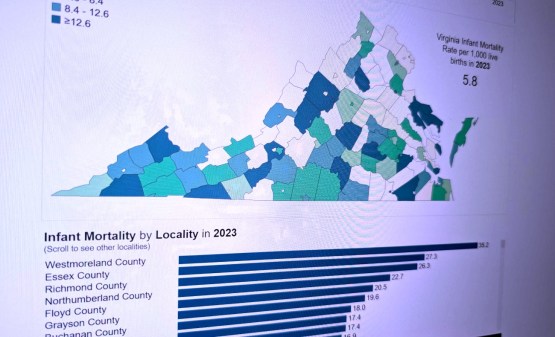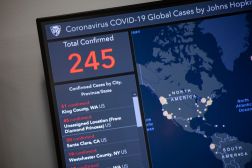Virginia opioid addiction datathon inspires 15 new apps

Virginia technologists recently presented 15 ideas for new apps and digital tools intended to put more useful information in the hands of opioid addicts, their families and public health workers.
The digital inventions sprung from Gov. Terry McAuliffe’s 2017 Governor’s Datathon on Sept. 28-29, which focused on the state’s opioid addiction crisis.
Tony Fung, Virginia’s deputy secretary of technology, said the Datathon, an annual coding competition that solves various civic challenges, focused on addiction this year because of its devastating impact across the state and an urgency to find fresh solutions.
Fung said the work also complements an intensive statewide initiative that began in 2016 when Virginia Health Commissioner Marissa Levine declared opioids a public health emergency.
The open data competition invited teams of engineers, designers and other IT experts to develop apps. The state reports cases of addiction and overdoses have grown year after year since 2010. Last year drug overdoses killed more than 1,400 Virginians, with 1,133 of those deaths — about 81 percent — caused by prescription opioids and heroin.
“In our overall goal, we asked how can we save lives and how can we improve the lives of Virginians afflicted by this crisis,” Fung said. “Addiction has a health aspect to it, there is public safety aspect, there’s an economic impact, there are social services that are involved. So if you think about all of these different services that the state delivers, this crises impacts across the spectrum.”
To assist officials and those suffering from addiction, technologists employed a variety of tactics at the Datathon. The third-place team, Data Knights, fashioned an app to prevent doctors from overprescribing pain medications — a common catalyst for opioid additions. The second-place finisher, Dataknots, designed a financial dashboard to identify how to get federal grants to areas where they are needed most. The winning team, Analytics Adventures, engineered an all-in-one mobile platform to provide drug addiction resources to everyone from the victims, to their families, to police, to medical providers and social services.
“Part of the reason why we’re in this opioid epidemic now is because of over prescribing, lack of education and lack of resources in the communities,” said Analytics Adventures Stas Novitsky in his presentation. “So what this aims to do is bridge all of that together in a single app for everyone across the board from youth, to adults, to parents to providers to community support.”
For those battling addiction the app provides a safe place to receive communication from support workers, a list of resources and self-help modules that walk users through the emotional obstacles their likely confronting while offering recovery advice. Parents get access to educational resources and a map of nearby support groups while the app provides first responders a predictive analytics feature that allows them to see where potential hot spots are for addiction.
The app also boasts dashboards for state departments who can get a complete run down of all relevant drug addiction data and data collected through the app. Analytics Adventures claimed the state could reduce opioid addiction by at least 30 percent with the app.
Fung said the team’s holistic approach, and the transparency given to addiction resources, made it an easy standout.
“They had an application that could provide different folks across the spectrum with resources,” Fung said. “So I think it was compelling from the standpoint that it was a practical solution, something that could be implemented without a lot of complexity, and just in its overall effectiveness.”
Going forward, Fung said the state plans to build on its growing collection of opioid-related open data and see if departments can iterate on the apps, perhaps scaling some of them across Virginia.
“It’s very much at a point where people can take these things and either leverage them or use them as a jumping off point to continue to build on new projects,” Fung said.
Fung said the typical government data and communication silos are a real problem for intelligence sharing between agencies and even within agencies. He advocated that more data sharing between departments and with the public is critical in finding more strategies to confront the problem.
“I think the hackathon complements our work, in the sense that we’ve got to do a better job of sharing data that is allowable for sharing across different domains like health and public safety for the betterment of citizens,” Fung said. “Data in silos only gives you a sliver of insight.”






